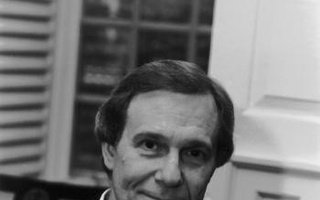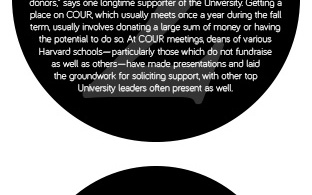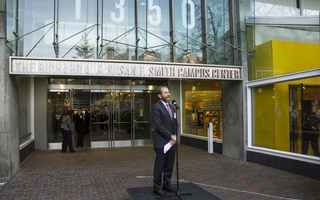“There’s a certain overlap and confusion between activities that are student-facing, dean-facing, management-facing, and at the same time alumni-facing,” Faust says. “Some [activities] fit into multiple categories.”
Dean of the School of Engineering and Applied Sciences Cherry A. Murray also says she multi-tasks; she often speaks with alumni on trips she takes to Washington for the several advisory boards she sits on external to her responsibilities at Harvard.
Of course, administrators’ heavy focus on fundraising is not new to this capital campaign’s public phase—even in non-campaign years, administrators including the University president and FAS dean devote significant amounts of time to speaking with alumni and donors.
Former FAS Dean William C. Kirby, whose time in University Hall in the mid-2000s did not coincide with a capital campaign, says he still spent a “significant amount” of time fundraising and engaging with alumni throughout his tenure, taking a number of trips to New York and “all across the country and to Asia and Europe.”
RALLYING THE TROOPS
Whenever University leaders take to the road, they have a chance to fundraise. But perhaps just as importantly, administrators seek to inspire a heightened sense of excitement at campaign events and use it as an opportunity to educate alumni worldwide on the priorities that Harvard has chosen to fund with its campaign. While this may not consist of directly soliciting, administrators say that it serves an important role in building social capital, which they hope will translate to physical donations.
Vice President for Alumni Affairs and Development Tamara E. Rogers ’74 says that Faust, in particular, is in a position to attract alumni to events.
“The President is always a big draw,” Rogers says. “Many alumni don’t have the opportunity to hear her speak. By her going around the country, it’s a great chance for people to finally have a chance to see her and hear her and then perhaps meet her at the reception afterwards.”
Garber, who serves in a similar role when he travels, agrees that Faust is the campaign’s prime messenger.
{shortcode-37aa8a17a74e40a0c8ae01b099b4eab44b7feaab}
“President Faust is very much the public face of the campaign, and she tells the story like nobody else can,” Garber says.
Former University President Neil L. Rudenstine, who traveled extensively when he led what is considered Harvard’s last capital campaign in the 1990s, suggests that the president’s most significant role is articulating the University’s priorities to the larger alumni community, rather than asking for money.
“That's the most important thing a President can bring,” Rudenstine says. “If you have a significant, very large campaign, as we did—at least measured by the ’90s standards—people want to hear from the President why it's so important. It's much more important than actually asking people directly for the money.”
When he traveled for his campaign, Rudenstine says he spent probably no more than half his time speaking with donors.
“I found on the whole that my asking people [for gifts] was very, very limited, and I much preferred to talk to people about what the needs were,” he says.
Read more in University News
One Harvard, One Campaign?Recommended Articles
-
Our Democracy Is Broken, But We Can Fix ItIndeed, in the wake of Citizens United and years of weak campaign finance laws, there is a lot we do not know about how our elected officials reached our TVs, our YouTube videos, and our ballots in the endless campaign leading up to Tuesday, November 6
-
Younger Crop of Donors Fueling Capital Campaign, Supporters SayHarvard has raised more than $900 million since the public launch of Harvard's capital campaign, and longtime supporters credit much of the progress to a new generation of donors.
-
Taxation or Donation?Without diminishing Mr. Griffin’s largesse, one of the structural factors that makes this donation possible is the longstanding preference in the tax code for charitable gifts that allows them to be tax-deductible.
-
 Q & A with Neil L. Rudenstine
Q & A with Neil L. Rudenstine -
 Popping the Question
Popping the Question -
 One Harvard, One Campaign?
One Harvard, One Campaign?













